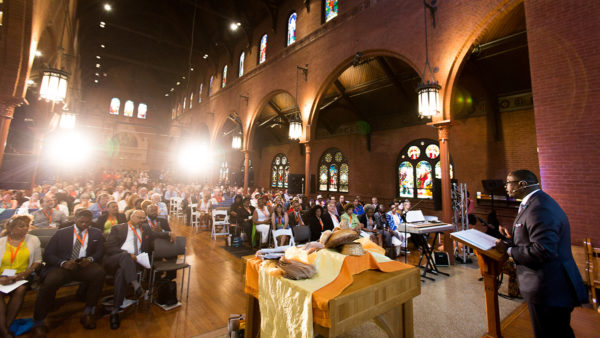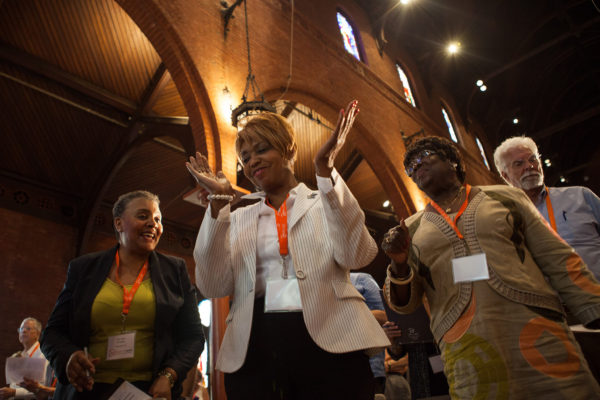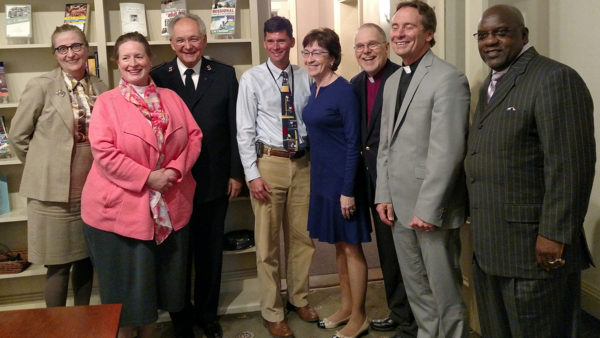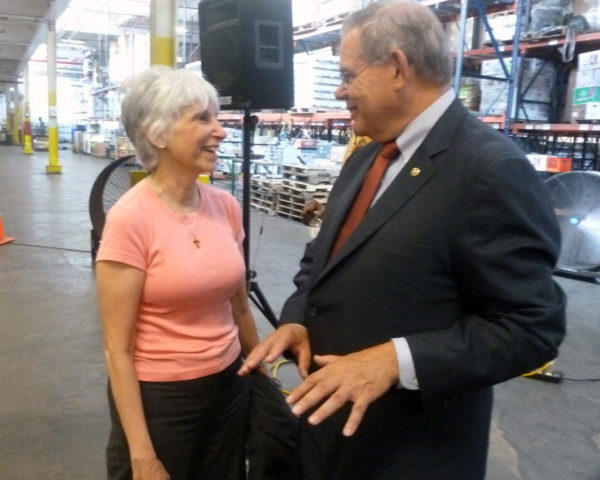Episcopal Church’s advocacy fights hunger at intersection of public policy, Christian valuesPosted Nov 20, 2017 |
|

Eric Mitchell, Bread for the World’s government relations director, speaks at a kickoff worship service for the nonprofit advocacy organization’s 2017 lobby day in Washington, D.C. The service was hosted by St. Mark’s Episcopal Church. Photo: Bread for the World
[Episcopal News Service] Every can of food donated to a church food pantry is welcome support for someone struggling to afford the next meal, though in the broader battle against hunger, there is nothing to match the scale of U.S. government spending.
The federal program known commonly as food stamps, as one example, is a multibillion-dollar safety net credited with raising millions of Americans out of poverty. And while Episcopal congregations’ food ministries can respond directly to their communities’ needs, the Episcopal Church also advocates at the federal level for programs that have a national and even international impact on food security.
‘Food and Faith’
Episcopal News Service’s five-part series focuses on anti-hunger efforts in the Episcopal Church, from food pantries to the church’s advocacy on government programs that fight hunger. The final story in the series will post next week. All stories in the series are available here.
Episcopal News Service’s “Food and Faith” series is highlighting ways the Episcopal Church is involved in efforts to fight hunger. Previous stories mined the scriptural basis for such work and detailed the ways some congregation-level ministries are making a difference, often through their partnerships with regional and national feeding agencies.
The Episcopal Church’s Washington, D.C.-based Office of Government Relations fights hunger at the intersection of public policy and Christian values – advocating based on General Convention resolutions by monitoring legislation, coordinating with partner agencies, developing relationships with lawmakers and encouraging Episcopalians’ activism through its Episcopal Public Policy Network.
“We as Episcopalians want to support the programs that help those who are living in poverty,” said Office of Government Relations Director Rebecca Blachly. “We want to show that there is a constituency of people who care about these big issues, and then we also need to be able to do our work in government relations.”
The stakes are high this year as Congress and the Trump administration wrestle over a federal budget and tax reforms that could result in sharp cuts in discretionary spending. An estimated 95 percent of food assistance in the United States is funded by the federal government, compared to private giving, according to a policy paper the Episcopal Church released this year on “Appropriations for Domestic Human Needs.”
The Episcopal Church amplified its anti-hunger advocacy starting in May, when it joined with the Evangelical Lutheran Church in America and other Christian advocacy partners in the prayer, advocacy and fasting campaign called “For Such a Time as This.” The fasting is scheduled for the 21st of each month during the current Congress because that is when monthly food stamp benefits typically run out for families participating in what is officially known as the Supplemental Nutrition Assistance Program, or SNAP.
“We are asking you to join with other Christians and other people of goodwill to help our government reflect the best of the American spirit by feeding the hungry, caring for our children, and making sure that everyone has the opportunities for life and liberty not only in our country, but in our world,” Presiding Bishop Michael Curry said in a message kicking off the campaign.

About 400 people, including Episcopalians, participated in Bread for the World’s Lobby Day in June after gathering for breakfast and worship at St. Mark’s Episcopal Church near Capitol Hill. Photo: Bread for the World
Episcopalians also joined with the ecumenical organization Bread for the World for its annual lobby day in June, which began with a breakfast and worship service at St. Mark’s Episcopal Church near Capitol Hill. About 400 participants spent the day meeting with lawmakers on Capitol Hill to persuade them to support programs that alleviate hunger.
Curry has often stressed that the Episcopal Church’s political activism isn’t based in partisanship but rather in values, as guided by resolutions passed by General Convention. Those resolutions have pledged the church’s support for numerous federal programs, some administered by government agencies and others administered by local organizations, including churches in some cases.
“God has provided for all of creation, forming a world of sufficiency for all,” a 2015 resolution states. “Inequality exists not because there is not enough, but because of the way resources are distributed; we depend on God and one another and are commanded to feed the hungry, clothe the naked, and comfort the suffering and afflicted.”
Programs like SNAP, the national school lunch program, Temporary Assistance for Needy Families, or TANF, and food assistance available through the Women, Infants and Children, or WIC program “lift and keep people out of poverty and address basic food and health care needs in vulnerable populations,” the General Convention resolution says.
Episcopalians can add their voices, make a difference
SNAP alone provided $66.5 billion in benefits to more than 44 million Americans in 2016 to help them buy food. It was credited with lowering the U.S. poverty rate by 8 percent in 2009, at the end of the last recession.
“SNAP is a wonderful, effective program,” said the Rev. Diane Riley, a vocational deacon from the Diocese of New Jersey who has worked for years toward hunger and poverty relief. “If you cut that you will never be able to make up that food with your food drives.”
Episcopalians like Riley can get involved in the political process in a range of ways that reflect their faith values, from calling or emailing the office of their elected representatives to paying a visit to their representative’s district office and arranging to meet with the lawmaker or staff.
When those kinds of direct appeals are based in a deep personal commitment to an issue, they can have a big impact on policy decisions, said Riley, who serves at Good Shepherd Episcopal Church in Montville, New Jersey.
“Our faith calls us to think deeply about everything we do,” she said. “I know that’s daunting, but it doesn’t have to be daunting.”
The Office of Government Relations is a key resource for Episcopalians who are thinking deeply about hunger issues but don’t know where to start. They can subscribe to the office’s Episcopal Public Policy Network, or EPPN, and receive emailed policy alerts letting them know to contact their representatives when certain legislation is advancing. Some of those alerts allow recipients to fill out simple forms with their messages to lawmakers and provide guidance on what to say when making contact. Episcopalians also are encouraged to learn more about the issues on the Office of Government Relations website.
The office also partners with other organizations, like Bread for the World, to coordinate anti-hunger advocacy. Bread for the World has led planning of the “For Such a Time as This” fasting campaign.
“The Episcopal Church has actually been one of our biggest partners in regards to pushing Congress to support proposals to help end hunger and poverty,” Eric Mitchell, Bread for the World’s government relations director told ENS. He cited the Episcopal Church’s involvement in the “For Such a Time as This,” as well as Circle of Protection, an ecumenical initiative to protect social safety net programs.
In addition to participating in the lobby day, Episcopalians have contacted and met with lawmakers on their own to support safety net programs that include hunger-relief spending.

Diocese of Maine Bishop Stephen Lane hosted a meeting in October between a Christian delegation and Sen. Susan Collins, R-Maine. Collins is in the center with Lane directly to her right. Photo: Diocese of Maine, via Bread for the World
Diocese of Maine Bishop Stephen Lane hosted a Christian delegation that met in October with Sen. Susan Collins to thank the Republican lawmaker from Maine for bucking her party’s proposals to roll back some or all of the Affordable Care Act, also known as Obamacare. Although that meeting wasn’t focused specifically on hunger issues, Lane said such personal contacts with lawmakers are effective in influencing a range of government policies in ways that reflect the Christian calling to serve the poor.
“As a follower of Jesus, I have a message of carrying and compassion that needs to be heard in the public square, and one of our roles as church is to raise those concerns with our leaders,” Lane said in a phone interview with ENS.
His diocese also has formed the Maine Episcopal Network for Justice, with a mission that includes training Episcopalians on ways to lobby their state’s lawmakers.
“I believe that the health of a society is measured by the way we care for our weakest citizens, and we need to be constantly reminded of that as a society,” Lane said. “God cares for the least and the lost, and it’s a measure of maturity of our society that we pay attention those folks.”
Riley, who now works as executive director of the Supportive Housing Association of New Jersey, previously served as director of advocacy for the Community FoodBank in New Jersey. In that role, she would travel to Washington, D.C., a few times a year to attend conferences, visit members of Congress and participate in events promoting anti-hunger efforts.

The Rev. Diane Riley meets with Sen. Robert Menendez during the New Jersey senator’s 2013 visit to the Community FoodBank in Hillside, New Jersey. Riley was the food bank’s director of advocacy at the time. Photo: Maria Christina Hernandez, via Diane Riley
She also has worked on policy issues back in New Jersey, such as when she welcomed Sen. Robert Menendez at the FoodBank in 2013 at a time when he was advocating for maintaining food stamp spending. Riley also was involved with making improvements to how New Jersey administers SNAP benefits for its residents.
But Episcopalians don’t have to work a full-time job in the social service sector to make a difference. One way to fight hunger locally is to get involved in your school district, Riley suggested, by making sure school officials are aware of all federally supported school meal programs.
Again, the Office of Government Relations can help, with policy papers on some of the top issues facing Congress, including school meals and SNAP funding.
“You can see how that kind of advocacy can really work,” Riley said.
Feeding the hungry at home and abroad
Hunger is also a global problem, and the global reach of the Anglican Communion means individual provinces, like the Episcopal Church, can leverage that network to make a difference in alleviating hunger wherever it may be in the world, said the Rev. Michael Battle, professor of church and society at General Theological Seminary.
“We say we can address those things together as one identity, as Anglicans,” Battle said.
Some of that work takes the form of direct aid from agencies such as Episcopal Relief & Development that take the donations made by Episcopalians in the pews and use them to feed people in disaster areas around the world. Anglican Alliance helps coordinate such efforts across the Anglican Communion.
The Episcopal Church also advocates for U.S. government policies and foreign aid that can alleviate global hunger, reflecting what Battle sees as a positive evolution in the church.
“The Episcopal Church may be leading the Anglican Communion, of moving from the church of the establishment to the church of advocacy,” Battle said.
Foreign aid, supplemented with donations by Episcopalians, can go a long way toward fighting hunger in poorer countries around the world – including in Episcopal dioceses. Haiti, for example, lacks the resources of its wealthier neighbors, but American congregations have been generous in supporting the Diocese of Haiti, especially after a devastating earthquake struck the Caribbean country in 2010.
Foreign policy is a large part of the “For Such a Time as This” fasting campaign, which highlights the rising threat of famine in parts of the world.
“As we look overseas, we must acknowledge that foreign assistance and humanitarian relief can help to address regions confronting famine and food insecurity, including South Sudan, Somalia, Yemen, and Lake Chad Basin,” Curry said in his statement for the campaign’s kickoff. “We will challenge proposals to eliminate or defund proven anti-poverty programs, at home and abroad.”
Blachly said that Episcopalians, rather than tune out the needs of people on the other side of the world, are generally interested in reaching out a helping hand to those suffering from hunger overseas, both through financial giving and by supporting Episcopal Public Policy Network’s advocacy efforts on those issues.
Whether the hunger is domestic or foreign, though, there typically are underlying issues at the root of the problem. In a place like South Sudan, war is a greater cause of famine than drought. And in the United States, hunger often goes hand in hand with poverty.
An estimated 12.7 percent of Americans lived in poverty in 2016, and 41.2 million were said to be food insecure, meaning they lacked access to enough food to maintain an active and healthy life.
And last year, the number of children receiving free meals through the National School Lunch Program topped 20 million for the first time.
“If someone is hungry, there is a much deeper problem, so you can’t just try to address giving people food without addressing why people are hungry in the first place,” Battle said.
Time and again, when discussing such issues, those involved in the fight against hunger cite the old saying that if we teach people to fish they’ll fish for a lifetime. Riley, the New Jersey deacon, offered a caution to all who may reflexively nod heads in agreement, inviting them to think about the real-world context of that lesson.
“Can they afford the rods to fish? Do they have access to the lake to fish?”
Such questions that should compel us to “think deeply,” she said, about what we really need to do to make a difference in the lives of others.
– David Paulsen is an editor and reporter for the Episcopal News Service. He can be reached at dpaulsen@episcopalchurch.org.

Social Menu